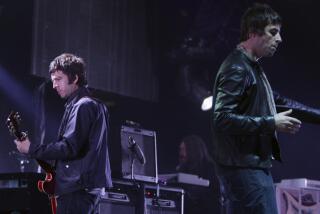Rock Group Files Complaint Over Alleged Tactics of Ticketmaster : Entertainment: Attorneys for Pearl Jam say the agency pressured promoters to not book the band because it wanted to sell tickets at lower prices. Ticket firm says it operates within the law.
- Share via
In a memorandum to the U.S. Justice Department, the rock band Pearl Jam has complained that Los Angeles-based Ticketmaster successfully pressured promoters to boycott the band’s low-cost concert tour this summer.
Lawyers for the Seattle-based band--the biggest-selling rock group in the country--made the complaint May 6 in a memo to the department’s antitrust division. The memo accused Ticketmaster--the world’s largest ticket agency--of exercising a monopoly over ticket distribution in this country and using that influence to keep promoters from booking the Pearl Jam tour, which has been canceled.
The memorandum, filed by Sullivan & Cromwell, a prominent New York law firm, said that Ticketmaster has exclusive arrangements with all important concert venues in the country and uses these arrangements to “cement control over the distribution of tickets to concerts.”
The Justice Department has begun an evaluation of the memo, and sent three officials to Los Angeles on Tuesday to interview music business figures, sources said. Such an evaluation is in some measure a standard response to such a complaint. It is preliminary to a decision on whether to launch an investigation.
A spokeswoman for the Justice Department declined comment. Representatives for Pearl Jam also did not comment.
In a letter to The Times, Ticketmaster Vice President Ned S. Goldstein said, “Ticketmaster operates fully and squarely within the parameters of all applicable laws.”
Sales of Pearl Jam’s last two albums together exceeded $137 million. Ticketmaster, which is privately held, last year reportedly earned about $200 million in service and sponsorship fees on $1.3 billion in sales of tickets to concert and sporting events.
The Pearl Jam memorandum is likely to focus new attention on a growing furor over skyrocketing concert ticket prices and service fees, and the arrangements among managers, promoters and service companies that underlie pricing decisions.
Ticketmaster collects a phone service fee for tickets to rock and pop concerts, typically $6 to $8 per ticket, although the agency’s fee for $350 tickets for Barbra Streisand shows amounted to $18 in some cities. Ticketmaster pays a portion of the fees to maintain exclusive long-term contracts with the owners of the largest concert venues. Ticketmaster also pays a portion to some promoters, managers, agents and artists.
In March, Pearl Jam sent letters to promoters vowing to give concerts this summer only at venues that charged $18 for a ticket and no more than $1.80 for service or handling charges. A representative of the band said Pearl Jam was seeking to keep prices in a range their young fans could afford.
But sources in the concert industry said the group encountered immediate resistance from Ticketmaster and members of the North American Concert Promoters Assn., a McLean, Va.-based group that represents the nation’s largest promoters.
In two letters obtained by The Times, Ben Liss, the executive director of the association, warned promoters that if they booked Pearl Jam under the band’s conditions, they could face possible lawsuits.
Ticketmaster “views the Pearl Jam issue as an all-or-nothing proposition,” Liss wrote in one of his letters on March 24. Ticketmaster chief executive Fred Rosen “has indicated that he intends to take a very strong stand on this issue to protect Ticketmaster’s existing contracts with promoters and facilities and, further, (Ticketmaster) will use all available remedies to protect itself from outside third parties that attempt to interfere with those existing contracts.”
Liss did not return phone calls seeking comment.
After being turned down by virtually every major promoter in the country for bookings, Pearl Jam postponed its summer tour.
Ticketmaster has dominated the ticket market since 1991. In May of that year, the Justice Department’s antitrust division gave the go-ahead for Ticketmaster to buy certain assets from Ticketron. At that point, Ticketron was Ticketmaster’s only major competitor.
The government inquiry comes at a time when Ticketmaster plans to expand into a variety of new ventures, including movie ticket sales and an interactive TV channel devoted to tickets, concert merchandise, records and videos.
Ticketmaster is controlled by billionaire Paul G. Allen, who co-founded software giant Microsoft and who owns the Portland Trail Blazers basketball team.
Allen reportedly paid more than $250 million in November for controlling interest in Ticketmaster from the Chicago-based Pritzker family, who retain a small piece of the firm as part of their vast holdings, which include the Hyatt hotel chain.
Allen, who also holds a 24% stake in the America Online interactive computer service, has joined forces with EMI Music, PolyGram, Sony Music and the Warner Music Group to create a video music channel to challenge MTV.
Executives of those four recording conglomerates have been subpoenaed in a separate antitrust inquiry by the Federal Trade Commission that is investigating compact disc pricing policies.
Times staff writer Ron Ostrow in Washington contributed to this story.
More to Read
The biggest entertainment stories
Get our big stories about Hollywood, film, television, music, arts, culture and more right in your inbox as soon as they publish.
You may occasionally receive promotional content from the Los Angeles Times.








